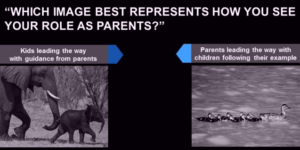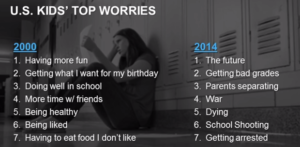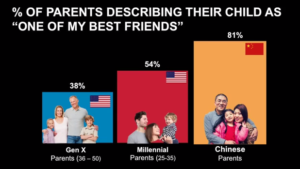
This is an insightful TED Talk on how parenting styles and approaches have been shifting fundamentally from parents leading the way for their children to follow and being the decision-makers in households, to that of being the elephant pictured above, where the child leads the way and parent supports from behind. George Carey describes this shift and provides an overview of how the hierarchy decision-making in families is evolving into more of a web, where children have a shared role in making decisions that affect the whole family. What I find relevant in this presentation to the things we talk about in mental health is whether our children are developmentally ready for this level of participation – do they have the emotion regulation skills in place to deal with the weight of certain decisions, are they prematurely moving away from thinking about “kid” matters and being encouraged or permitted by their parents to be participating in more “adult” matters? Is there a relationship with this generational parenting shift and the rise in mental health concerns in our youth, such as anxiety, depression, self-injury and suicide?

Mr Carey presents the results of a survey about what kids spent their time thinking about in 2000, such as doing well in school and having more time with friends, as compared to 2014, where the same demographic of children are thinking about war, dying, school shootings and their future.
The relationship to mental health conditions, suicidal ideation, and self injury is not altogether clear, nor was it presented in this talk. I will be the first person to remind us that parents ought never to be blamed for their child’s mental illness. However, I do recognize that when mental illness was highly prominent in my family’s daily life, I really needed to look at the role I saw myself filling as the adult in the household. For many youth who are struggling with skills in regulating their emotions, effective problem-solving, and managing their worries and concerns, it’s important that we don’t push
 them into adult roles where a fully developed brain is essential to their success. After all, that organ is not fully developed and wired up for certain functioning until well into our twenties. Practicing decision-making on certain things that are developmentally fitting happens incrementally over time and striking that healthy balance between allowing enough, but not too much is, for many of us, an art we parents learn over time.
them into adult roles where a fully developed brain is essential to their success. After all, that organ is not fully developed and wired up for certain functioning until well into our twenties. Practicing decision-making on certain things that are developmentally fitting happens incrementally over time and striking that healthy balance between allowing enough, but not too much is, for many of us, an art we parents learn over time.